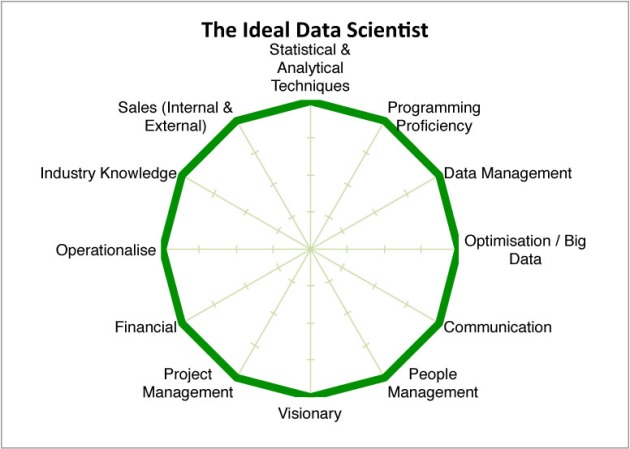If you look up the word ‘Ideal’ in the dictionary we get: “A person or thing regarded as perfect”. This definition stems from moral philosophy where perfection or ‘the ideal’ is seen not as something attainable, but rather the direction one should strive towards.
In order to become a better data scientist, one approach would be to define the ideal data scientist and begin by striving towards that ideal. The goal of this blog is to help you accomplish that task, by sketching the different skills a data scientist may have and discussing how and why different positions place emphasis on different skills.
Producing valuable insight from data requires more than just an ability to understand or implement a statistical technique. It requires an ability to communicate, understand existing challenges, manage data and (sometimes) bigger data, quantify and justify trade-offs, deliver outputs at the right time, and help others see the value.
In order for organisations to generate valuable insight, skills across multiple dimensions are required. Most likely, these skills re brought together by a combination of people who have different, but complimentary, skill sets.
For example, data science teams in startups usually consist of someone who can manage the data and someone who can build the predictive models. Each may be proficient at the other’s area, but their key contribution comes from what they’re responsible for delivering. Imagine a CEO recruiting for this team, suppose the choice is between (a) a generalist who could do both tasks well or (b) a specialist who could build models that are 50% better than the generalist, but manage data with 50% less ability. What choice do you think the CEO will make?
As teams grow larger, or as problems require relatively more of a particular skill set, there can be great demand for more specialist data scientists. As business priorities change, an ability to adapt become more important, and often more generalist data scientists become successful.
I propose the complete set of skills that a data science team needs in order to be successful. From this beginning, the objective of this blog will be explain each and describe way’s in which you can demonstrably improve your ability to preform in that area. Some of these may seem outside the traditional ‘data scientist’ job description, but the focus here is to identify the sills that together make the Ideal data scient team.
Please share your experience, and let me know what you think in the comments below.
‘Building Things’ Skills
- Statistical & Analytical Techniques: Able to understand and use statistical or machine learning approaches for a particular problem
- Programming Proficiency: Can write well structured, reliable code that achieves project aims
- Data Management: Understands, and can work with / develop large structured databases and data schemas.
- Optimisation / Big Data: Architects & implements solutions to scale methods from desktop to server or server to cluster
‘Sharing Things’ Skills
- Communication: Knowing how often, at what level of detail and when to communicate to others. Emphatic.
- People Management: Supports others in succeeding; let’s them know (and help’s them out) when they’re not
- Visionary: Inspiring; helping others believe that achieving a difficult goal is possible; respected
‘Coordinating Things’ Skills
- Project Management: Managing for an ‘on time’ and ‘on budget’ delivery. Recognizing early when this will not happen
- Financial: Able to quantify financial value to organisation of insight, supports trade-off decisions or business case development
- Operationalise: Can take a solution and transition it from one-off/bespoke to business as usual
‘Selling Things’ Skills
- Industry Knowledge: Can provide perspective on key stakeholders, history of failed / successful products and customers reaction. Has relationship with some key industry players.
- External Sales: Knows customer’s pain points, seeks and sells insights that address these pain points
In a later post, I plan on outlining how these skills work well together, but int he main time, you might want to think about what your strengths and weaknesses are, and what you’re organisation may be lacking.
Simple Self-Assessment.
- On a five point scale, rank your current ability in the areas below
- On the same five point scale, rank where you would like to be in 1-year and 3-years (this will help you think through how to focus your development efforts)
Data Science
- Statistical & Analytical Techniques:
- Programming Proficiency:
- Data Management:
- Optimisation / Big Data:
- Communication:
- People Management:
- Visionary:
- Project Management:
- Financial:
- Operationalise:
- Industry Knowledge:
- External Sales:
You can sketch your score on the radar chart below and share your experience on our facebook page (which itself is a brand new experiment).

This blog is a very good initiative.